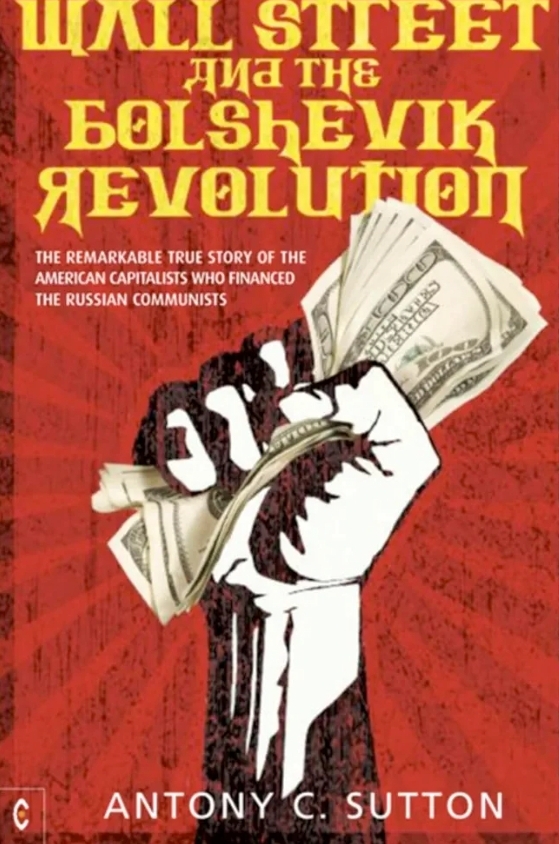Details comcerning Antony C. Sutton Wall Street and the Bolshevik Revolution: The Remarkable True Story of the American Capitalists Who Financed the Russian Communists
Antony C. Sutton was a British-American economist, historian, and writer known for his works on the intersection of Western economic and political interests with global events. One of his most notable books is “Wall Street and the Bolshevik Revolution,” where he explores the connections between American financial elites and the Russian Bolshevik Revolution of 1917.
Central Thesis:
Sutton’s central argument in the book is that certain powerful American financial interests, particularly those on Wall Street, played a significant role in financing and supporting the Bolshevik Revolution. Sutton challenges the conventional narrative that communism and capitalism are fundamentally opposed by suggesting that certain capitalist interests actually benefited from the rise of Bolshevism in Russia.
Key Points and Arguments:
- Financial Support for the Bolsheviks:
- Sutton presents evidence that American bankers and industrialists, including figures associated with J.P. Morgan and other financial institutions, provided financial support to the Bolsheviks before and after they took power in Russia.
- He argues that this support was motivated by a combination of profit and political strategy, as these financiers saw opportunities in the chaos of the Russian Revolution.
- The Role of Key Individuals:
- Sutton discusses the involvement of key American figures like William Boyce Thompson, a director of the Federal Reserve Bank of New York, and Jacob Schiff, a prominent investment banker, in supporting the Bolsheviks.
- He suggests that these individuals had vested interests in the Bolshevik success, either through direct financial involvement or through ideological sympathies.
- The Bolshevik Government’s Relations with Western Capitalists:
- The book examines how the early Soviet government, despite its anti-capitalist rhetoric, maintained covert ties with Western capitalist enterprises.
- Sutton argues that these relationships were mutually beneficial, as they allowed the Bolsheviks to consolidate power while enabling Western capitalists to exploit Russia’s resources and markets.
- Implications for Understanding History:
- Sutton’s work challenges the dichotomy often drawn between capitalism and communism, suggesting that high-level cooperation between the two systems has occurred when it served mutual interests.
- He proposes that understanding these connections is crucial for a more accurate interpretation of 20th-century history, particularly in relation to the Cold War and the global spread of communism.
Controversy and Criticism:
- Sutton’s thesis is highly controversial and has been met with significant criticism, especially from mainstream historians. Critics argue that his evidence is selective and that he overstates the influence of Western financial interests on the Bolshevik Revolution.
- Some also argue that Sutton’s work leans towards conspiracy theory, as it suggests an orchestrated effort by capitalist elites to control global events through covert means.
Legacy and Influence:
Despite the controversy, Sutton’s work has had a lasting impact on discussions about the relationship between capitalism and communism, and it remains a reference point for those who argue that economic and political history is shaped by powerful, often hidden, interests. His book is still cited in debates over the true motivations behind key historical events and the role of elites in shaping global affairs.
Overall, “Wall Street and the Bolshevik Revolution” is a provocative and thought-provoking work that continues to be discussed and debated by scholars, political theorists, and those interested in alternative interpretations of history.
How the American Capitalists Financed Russian Communists by Sutton
In “Wall Street and the Bolshevik Revolution,” Antony C. Sutton argues that certain American capitalists and financial elites provided significant financial and logistical support to the Bolsheviks before, during, and after the Russian Revolution of 1917. Sutton’s work suggests that this support was not just incidental but part of a broader strategy by these capitalists to influence the outcome of the revolution and benefit from the resulting political and economic upheaval.
Key Mechanisms of Support as Identified by Sutton:
1. Direct Financial Contributions:
- Jacob Schiff: Sutton points to Jacob Schiff, a prominent New York banker and head of Kuhn, Loeb & Co., as a key figure in financing the Bolsheviks. Schiff, who had long been an opponent of Tsarist Russia due to its anti-Semitic policies, allegedly provided substantial funding to the Bolshevik cause. Schiff reportedly supported the revolution both directly and indirectly through various intermediaries.
- William Boyce Thompson: A director of the Federal Reserve Bank of New York, Thompson is said to have contributed large sums of money to the Bolsheviks. According to Sutton, Thompson saw the revolution as an opportunity to gain economic influence in Russia and prevent Germany from gaining access to Russian resources during World War I.
2. Facilitating Bolshevik Propaganda:
- American Red Cross Mission: Sutton claims that the American Red Cross mission to Russia in 1917, ostensibly a humanitarian effort, was in fact used by certain financiers to provide support to the Bolsheviks. Sutton argues that this mission was heavily influenced by Wall Street interests and served as a cover for political and financial activities that aided the revolutionaries.
3. Logistical Support and Political Maneuvering:
- Leon Trotsky’s Return to Russia: Sutton discusses the involvement of American financiers in facilitating Leon Trotsky’s return to Russia from exile in the United States. Trotsky, who would become a key leader of the Bolshevik movement, was reportedly assisted by individuals connected to Wall Street, ensuring his safe passage despite British attempts to detain him.
- Recognition and Diplomatic Support: After the Bolsheviks seized power, Sutton argues that certain American businessmen and diplomats worked behind the scenes to secure recognition for the new Soviet government, thereby legitimizing their rule and paving the way for future business deals.
4. Investment in Soviet Enterprises:
- Post-Revolution Business Deals: Following the Bolshevik victory, Sutton suggests that American businesses, particularly those with ties to Wall Street, were involved in establishing economic relationships with the new Soviet government. This included investing in Soviet enterprises and providing technical assistance and industrial equipment, which helped the Bolsheviks consolidate power and rebuild Russia’s economy under communist rule.
Sutton’s Interpretation:
Sutton interprets these actions as part of a broader strategy by certain American capitalists to manipulate global events to their advantage. He argues that these financiers were motivated not by ideology but by a desire to protect and expand their economic interests. By supporting the Bolsheviks, they aimed to create a new, controllable market in Russia, weaken Germany during World War I, and counterbalance British influence in Eurasia.
Controversial Aspects:
- Conspiracy Theories: Sutton’s thesis has been criticized for its reliance on what some consider to be speculative connections and circumstantial evidence. Critics argue that while some American financiers may have had ties to individuals involved in the Bolshevik movement, there is insufficient evidence to support the claim that Wall Street deliberately orchestrated or financed the revolution on a large scale.
- Selective Use of Evidence: Sutton’s work has also been criticized for selectively using sources that support his thesis while ignoring counter-evidence. Some historians suggest that his interpretation oversimplifies the complex motivations and dynamics at play during the Russian Revolution.
Impact and Legacy:
Despite the controversy, Sutton’s work has had a significant impact on discussions about the relationship between capitalism and communism, particularly in the context of global power dynamics. His arguments have influenced a variety of alternative historical narratives and have been referenced by those who question the conventional understanding of the Russian Revolution and the motivations of Western elites during this period.
Overall, Sutton’s “Wall Street and the Bolshevik Revolution” presents a provocative and challenging perspective on the financial and political forces that shaped one of the most significant events of the 20th century.







